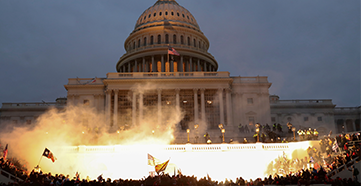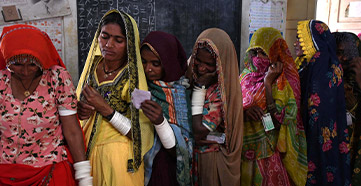2024: the year of elections
Ruth Green, IBA Multimedia JournalistMonday 18 March 2024

In 2024, more than half the world’s population, in more than 80 countries, will vote in elections. Disinformation and deepfakes threaten to disrupt elections on an unprecedented scale. It’s a testing year, for democracy and for the rule of law.
Of the 40 elections, nearly half are in Africa. South Africans will celebrate the 30th anniversary of the first free and fair elections that drew a line under apartheid. The South African general election could, though, bring the continent’s biggest democratic upset, with pre-election polling suggesting the ruling African National Congress might lose its majority for the first time in three decades.
Comoros kicked off the continent’s election cycle with the re-election of President Azali Assoumani in January. Experts warn that a win for this tiny African state’s leader, whose tenure has been characterised by creeping authoritarianism and disputed elections, acts as a cautionary tale for the safeguarding of democratic norms across the continent.
Green shoots persist, however. Despite delays, Senegal’s President Macky Sall will stand down, allowing fresh leadership in the country for the first time in over a decade. South Sudan will finally hold its first national election since it became independent in 2011. This is marked progress given the continent has experienced waves of term limit evasion and military coups.
For other nations, 2024 will test the limits of free speech and trust in governments and institutions. Polling suggests far-right parties could make significant gains in the European Parliament elections in June. Portuguese voters have already turned away from mainstream politics. In the UK, public trust in parliament is dwindling, raising significant questions ahead of the general election.
Democratic checks and balances are also under pressure. In India, where Prime Minister Narendra Modi is on course to win a third consecutive term, the Supreme Court recently upheld the government’s controversial 2019 decision to strip the state of Jammu and Kashmir of its special status. This only reinforced concerns over the repression of minorities’ rights and the authorities’ growing influence over the judiciary.
It also stoked tensions in neighbouring Pakistan, where Kashmir has long been a flashpoint for Indo-Pakistani relations. Pakistan’s own election was tainted by allegations of ballot-rigging and intimidation, highlighting how democratic processes crumble in the face of an ever-widening crackdown on political opposition and civil society.
The same can be said for Russia, where the presidential election has been denounced as a ‘sham’. The death of opposition leader Alexei Navalny in February was a clear message that in 2024, there’s no place for dissent under Vladimir Putin’s rule – even if those who stand up to him are behind bars.
There’s growing unease that Putin’s re-election will embolden other authoritarian leaders. Indonesia recently voted in Prabowo Subianto, who has shown his support for the Russian president and his strongman tendencies. However, Alexander Stubb, known for taking a hardline on Russia, won a closely fought election in Finland – its first since the country’s historic move to join NATO in April 2023.
In this bumper year of elections, there will be numerous surprises and controversies, but also, hopefully, some welcome progress. Mexico is poised to elect its first ever female president, marking a turning point for gender parity in Latin America’s second-largest economy.
Arguably, the US presidential election poses the most crucial stress test for liberal democracy. As Donald Trump edges closer to an electoral rematch with President Joe Biden, it’s impossible to overstate how much this one vote could define 2024 as a year of democratic backsliding or democratic progress. The rule of law and everything it represents, hangs in the balance.
Read our regional coverage:



